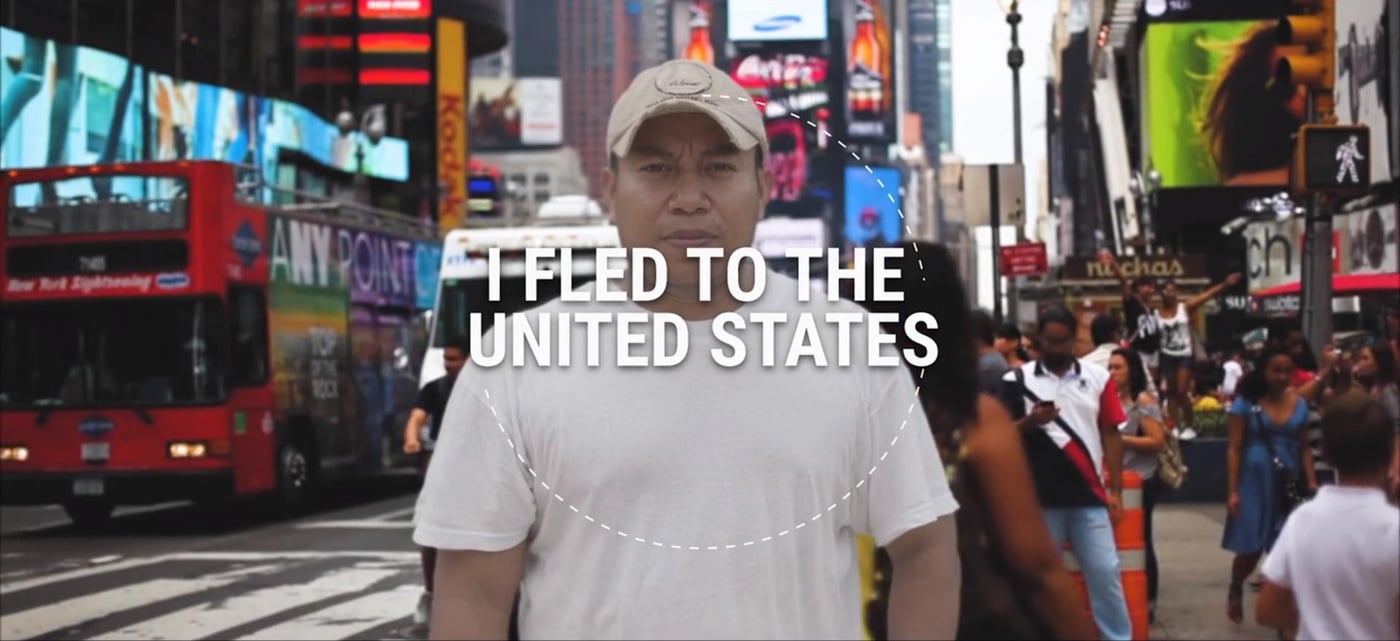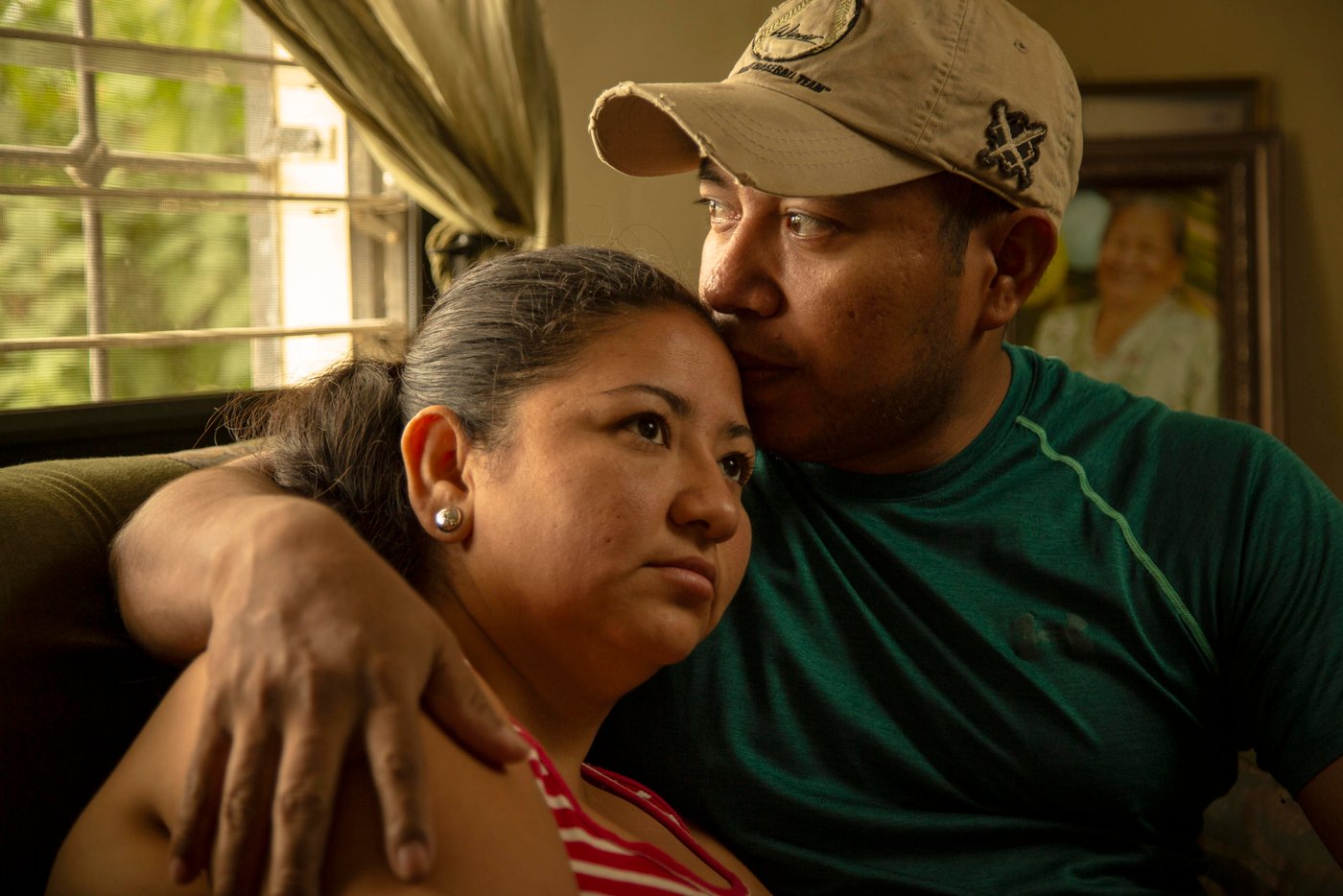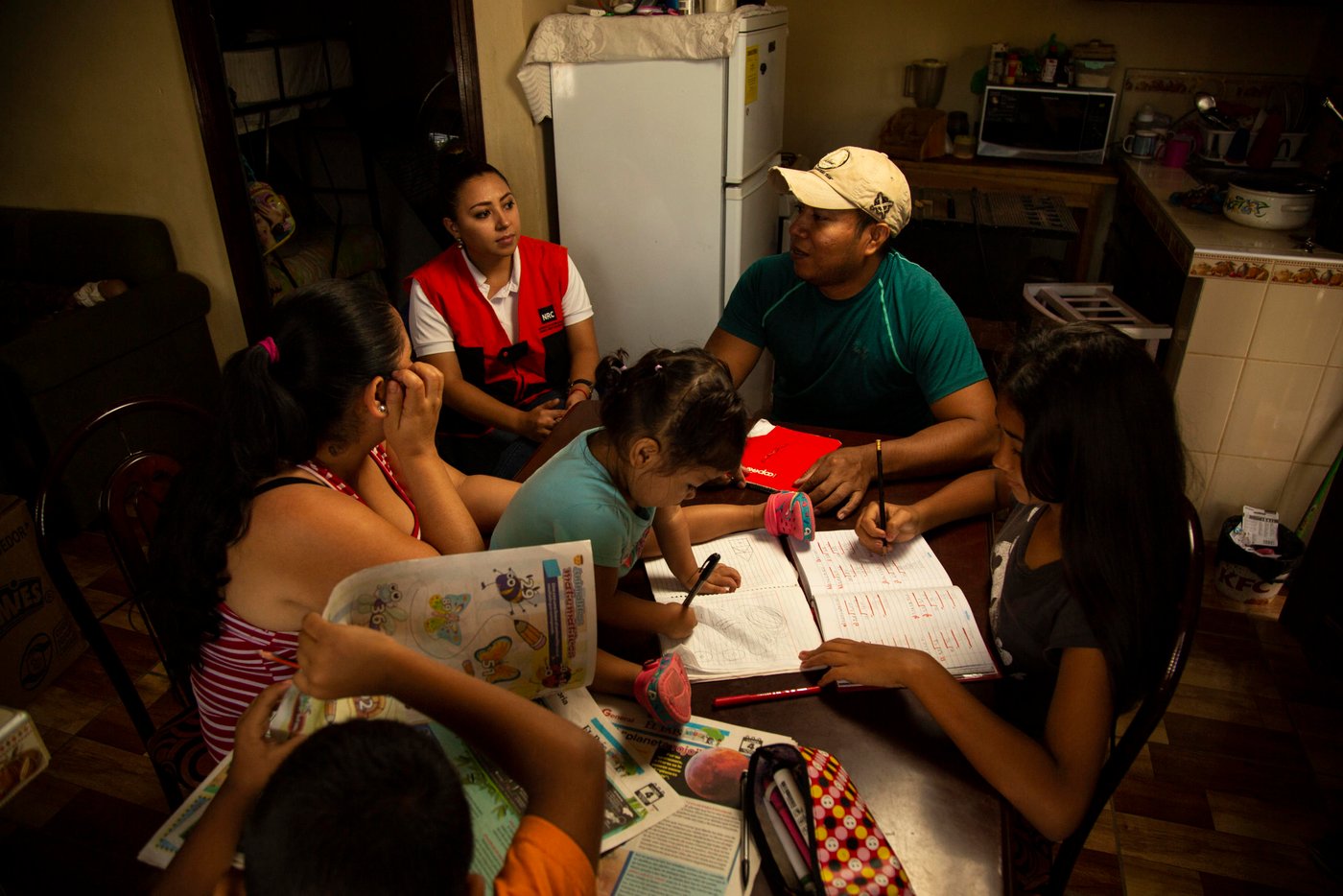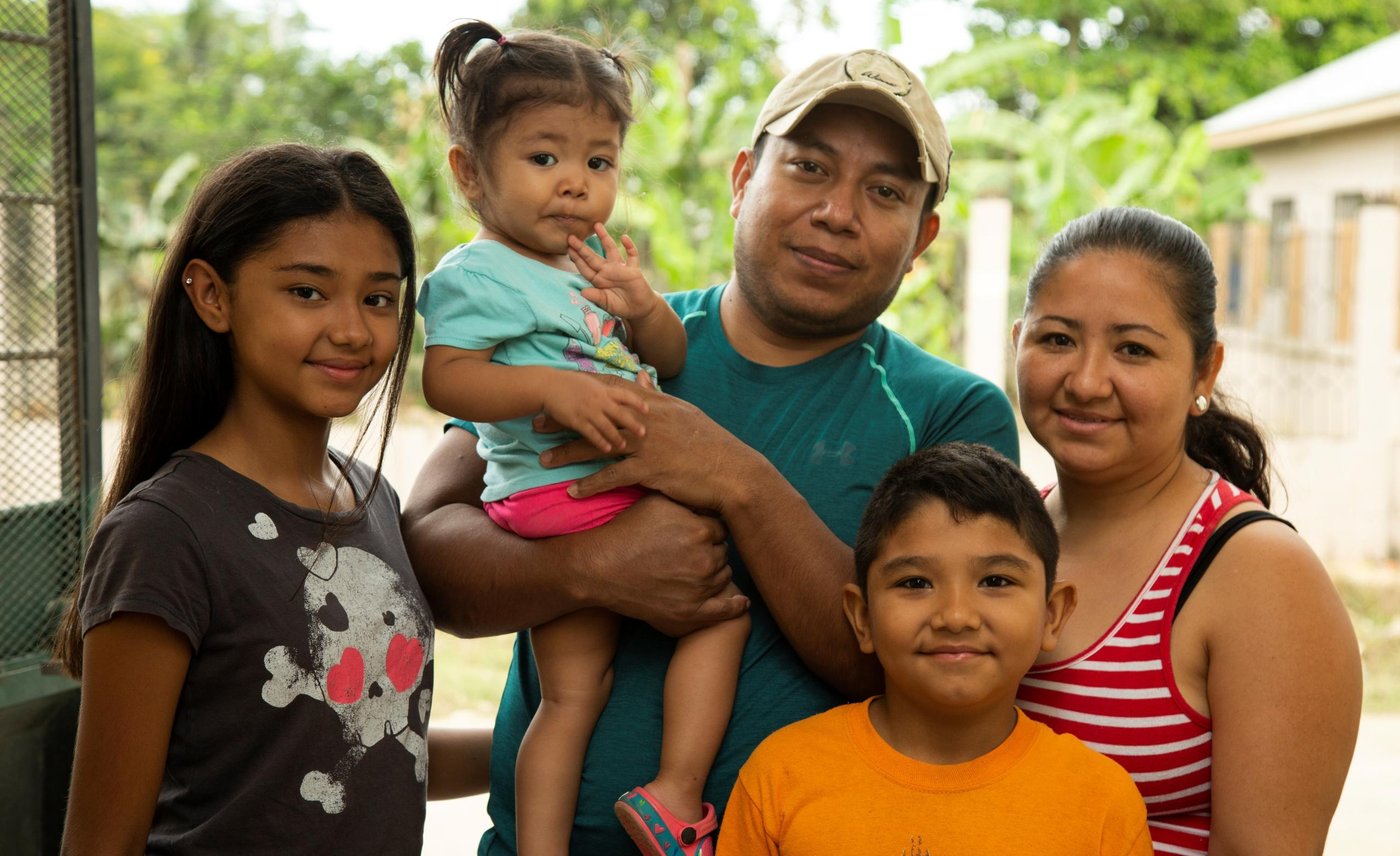Manuel walked 3,500 km in search of safety, only to be sent back home to Honduras. Now, with help from the Norwegian Refugee Council (NRC), he is building a new life for himself and his family in a safer part of the country.
Kidnapped at Christmas
It was the day before Christmas and there was no money for dinner. Manuel*, 35, an out-of-work carpenter and father of three, went out to sell donuts in his home city of San Pedro Sula, in northern Honduras. He got up at dawn, prepared the food and said goodbye to his wife. Little did she know he was leaving the home they shared for the last time.
While he was out, Manuel was kidnapped by one of the criminal gangs that controlled his neighbourhood. He was stopped in the streets by armed men with their faces covered. “I couldn’t pay the extortion money they were demanding,” he says, “so they beat and kidnapped me. One of them yelled at me: ‘nobody makes fun of us!’”
You either pay the extortion money or they kill youManuel, 35, from Honduras
The threats he had received during the previous months had ended with the deprivation of his freedom. Luckily, he managed to escape. He succeeded in untying himself when the guards weren’t looking and headed for the mountains. “You either pay the extortion money or they kill you,” he explains.
Manuel had sought help from the Honduran authorities, but had not been heard. He did not want to put his family at risk, but was not able to pay the extortion demands. Manuel decided to turn away from his family. He left without telling his wife and children.
Run away or pay the price
Criminal gangs control urban areas in Honduras through extortion, threats and assassinations. In these areas, adults and their families are restricted during night hours to schedules that prohibit the use of public spaces. Residents must comply with the rules and codes; for example, truck drivers who enter an area controlled by a criminal gang are strictly monitored and extorted.
Honduras has one of the highest homicide rates in the world. Those who do not comply with extortion demands have two options: run away or stay and pay the price.
Death threats and extortion mixed with poverty lead to displacement. In the areas most affected by violence, people like Manuel are often forced to move within and beyond their country’s borders in search of safety.
Read also: When violence has taken control

A journey without a destination
Manuel managed to flee. He had only one certainty: he could not return to his family.
Alone, without food, money or a concrete destination, he set off on foot to seek protection in another country – a journey that would take him more than ten months.
Manuel first arrived in Guatemala, hoping to start over and find a job. His priority was to save money and find a way to get his family away from the neighbourhood where they were living. He recalls: “I worked a week for 100 quetzales [USD 13] but it went bad, and they scammed me.” Hope in Guatemala quickly vanished.
For almost eight weeks, Manuel slept in the insecure and cold streets of Guatemala. He eventually decided to head north through Mexico, working where he could, and continuing his journey. On the road, he received help from church organisations. Without major setbacks, he reached the border with the United States.
I knew that I had to get out of where I was and save my childrenRocio, Manuel's wife
His family was forced to flee
A month after his kidnapping, Manuel manage to contact his wife, Rocio*. “When we found out that he was alive, I knew that I had to get out of where I was and save my children. He was no longer with us and the extortions didn’t stop,” she explains.

Thus, Manuel’s family made the difficult decision to flee the house that had been their home until then. They had to move.
Rocio packed what she could and left with her three small children aged 11, 7 and 1. They fled to a remote place in a rural area, far away from home. For the next six months, they lived on the generosity of acquaintances who welcomed them. Rocio managed to keep her children safe. She found a school for them nearby, and they walked 40 minutes each day to study.
Despite the seriousness of the situation, families in Honduras do not usually resort to official protection mechanisms, due to the widespread distrust of public institutions. Displaced people in Honduras tell us that going to the authorities can even put them at risk of retaliation from criminal gangs. For this reason, many people prefer to seek the support of relatives or acquaintances. Here, displacement leaves an invisible mark.
Rocio hid behind uncertainty. She and her family heard nothing from Manuel. Seven months after their last communication, she was losing hope of ever seeing him again.
If I have to die with my family, I willManuel
A 3,500 km walk to deportation
Manuel arrived exhausted in the United States, where he was promptly arrested. He asked for international protection, but months went by without an answer. The despair was unbearable and Manuel, a man who always wanted to protect his family, told the judge: “If I have to die with my family, I will.” Days later, Manuel was deported.
After walking 3,500 km across three countries for 240 days in search of protection, Manuel had only succeeded in obtaining a non-stop return ticket. He arrived back in Honduras in November 2018.
Disorientated, like many deportees, Manuel did not know what to do or how to find his family. He just wanted to avoid returning to his old house.
Read also: Hondurans repatriated to hopelessness

A tearful reunion
Then, his fortunes began to change. Manuel met an NRC staff member at the migration point where the organisation has a continuous presence to identify deportees in need of protection. He received assistance in accordance with his situation. “The first help was words,” he explains. “I arrived aimlessly. They supported me with a ticket to go find my family and from there they accompanied me.”
The idea of not knowing where his family was tormented him. But he managed to call an old neighbour who helped him to figure out where he could meet them.
“I arrived at night and they were shocked. My youngest daughter didn’t recognise me. But my wife started hugging me, crying and giving thanks that I was alive, because they had thought I was already dead.”
![In 2017, Manuel had to flee violence in Honduras. After being victim of criminal gangs, he crossed Central America to save his life and to look for hope for his family, but he was sent back to his country.
One deported, four displaced and one opportunity
“I fled my country and left my family behind because I was threatened. I asked for help in my country and in the United States, but I wasn’t heard. I was deported".
Without freedom, without family
There was only one day left for Christmas and there was no money for dinner. Manuel* (35 years old), a carpenter and without a job, got up at dawn, prepared several donuts and said goodbye to his wife to go out and sell them. That was the last day his family saw him leaving home.
Manuel was kidnapped. "I couldn't pay the extortion they were charging, they beat and kidnapped me. One of them yelled at me: nobody makes fun of us", Manuel said. The threats he had received during months were transformed into the deprivation of his freedom. "I escaped. I knew they would kill me next time”.
Manuel had sought help at Honduran authorities, but was not heard. He did not want to put his family at risk, he had no way to pay extortion. Manuel decided to turn away from his family. His wife and children never heard from him again.
Criminal gangs control urban areas in Honduras through extortion, threats and assassinations. In urban areas, adults and their families are restricted to night hours and schedules that prohibit the use of public spaces. The inhabitants must comply with the rules and codes; for example, those truck drivers admitted in an area controlled by criminal gangs are strictly monitored and extorted.
Those who do not comply with extortion payments have two options: run away or stay and pay the price.
A journey without destination
Honduras has one of the highest homicide rates in the world. The levels of violent killings are similar only in Syria, Venezuela and Afghanistan.
Death threats and extortion mixed with poverty precede displacement. In the areas most affected by violence, people like Manuel are forced to move within and beyond their country's borders in search of security.
Manuel managed to flee and he only had one certainty: He could not return with his family.
Alone, without food, money or a concrete destination, he began to walk for more than ten months to seek protection in another country.
Manuel arrived in Guatemala, hoping to start over and find a job. His priority was to save money and find a way to get his family away from the neighborhood where they lived. "I worked a week for 100 quetzales [12 euros] but it went bad, they scammed me". Hope in Guatemala quickly vanished.
For almost eight weeks, Manuel slept in the insecure and cold streets of Guatemala. He decided to continue his way through Mexico, worked in what he could and continued his journey. On the road, he received help from church organizations. Without major setbacks, he reached the border with the United States.
A simultaneous displacement
A month after the kidnapping, Manuel contacted his family. “When we got to know that he was alive, I knew that I had to get out of where I was and save my children. He was no longer with us and the extortions didn’t stop”, says Rocío*.
Manuel's family also makes the difficult decision to flee the house that had been their home until then. They had to move.
Rocío packed what she could and left with her three small children of 11, 7 and 1 year to a remote place, away from home. During six months, they lived on the generosity of acquaintances who welcomed them. Rocío managed to keep her children safe. She found a school nearby for the children who then walked forty minutes each day to study.
Despite the seriousness of the situation, families in Honduras do not usually resort to institutional protection mechanisms. When we talk to the population, they confirm the society´s distrust in public institutions, the police, the army, as well as the situation of corruption and impunity. The displaced population in Honduras even states that resorting to institutional mechanisms could pose risks related to retaliation from criminal gangs. For this reason, many people prefer to seek the support of relatives or acquaintances. The displacement only leaves an invisible mark.
Rocío hid behind uncertainty. She and her family never heard from Manuel again. Seven months after her last communication, she was losing the hope of seeing him again.
Suffering is not forever
“If I have to die with my family, I will. I told the judge in the United States”. Manuel was deported.
After crossing three countries and more than 240 days walking three thousand five hundred kilometers in search of protection, Manuel had only obtained a non-stop return ticket. Manuel returned to Honduras in November 2018.
Disoriented, as many deportees, Manuel did not know what to do and how to find his family. He just wanted to avoid the possibility of returning to his old house.
Thanks to funding from the European Union and the work of the Norwegian Refugee Council (NRC), Manuel received assistance in accordance with his situation and needs. “The first help was words. I arrived aimlessly. They supported me with a ticket to go find my family and from there they accompanied me”.
The idea of not knowing where his family was, tormented him. But calling a neighbour helped him to get hints to figure out where his family was. Being in another place, Manuel knew that his reunion would not be dangerous for him, nor for his family. A deported man went and meet four displaced persons.
“I arrived at night and they were shocked. My youngest daughter didn't recognize me. But my wife started hugging me, crying and thanking because I was alive because they already made me dead”.
A new home away from home
Thanks to the funding of the European Union and NRC´s action, Manuel and his family managed to find a safer place, received financial help to rent a house and access food. They also continued to receive our legal support to access their rights in Honduras and rebuild their life.
His children went back to study. This time, the school is a few streets away from home.
“I came to take my family out of the country, but with the help they have given me I have the peace of mind that I am not alone” says Manuel who, with parts of the money received, repaired his machine to resume his job as a carpenter. The wood has reshaped his life and his work gave stability to his family.
*The names have been changed for the protection of people.
Photo: Up Studio/NRC, 2019](/cdn-cgi/image/width=1400,format=auto,fit=crop,height=991/globalassets/images/countries/honduras/2019/kidnapped-deported-displaced-and-reunited/083a1001.jpg)
Home, work and peace of mind
Thanks to funding from the European Union and the support of NRC, Manuel and his family managed to find a safer place to live. They received financial help to rent a house and buy food. They also received legal support to access their rights in Honduras and rebuild their lives.
Manuel’s children are now studying again. This time, the school is just a few streets away from home.
“I came to take my family out of the country, but with the help I received I have the peace of mind of knowing that I am not alone,” says Manuel.
With some of the money he received, Manuel has repaired his equipment to resume his job as a carpenter. The wood has reshaped his life just as he reshapes the wood, and his work now gives much-needed stability to his family.
*Names have been changed for protection reasons.


